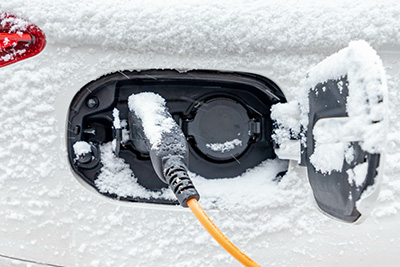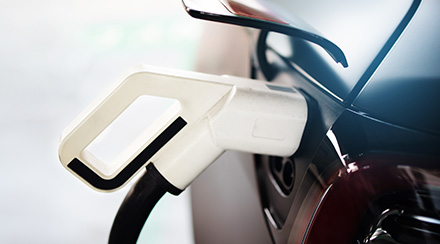Do Electric Cars Use Oil? Your EV Questions Answered

At a glance, most electric cars look just like their gasoline-powered equivalents. The experience of driving an electric car is similar, too. The difference is in the details – and if you become an electric car owner, those details can mean big changes for your garage, wallet and travel plans. Here are the answers to some of the most common questions about electric vehicles.
Do Electric Cars Use Oil?
No – electric cars do not use engine oil or need oil changes. While electric vehicles are not maintenance-free, many of the services offered by traditional lube shops simply don’t apply, including replacing engine air filters, drive belts and spark plugs.
Do Electric Cars Have Transmissions?
Yes – most EVs have transmissions, but the transmission of an electric car is much simpler than that of a gasoline-powered car. In a car with an internal combustion engine, the transmission will have several gears to provide a range of vehicle speeds. These multiple gears are necessary because combustion engines have a limited range of safe RPMs, and it would be impossible to achieve higher speeds in a single gear without overtaxing the engine. The electric motors in EVs are capable of much higher RPMs, and as a result, most electric cars have just one or two transmission gears.
Some electric cars use transmission fluid, while others do not. Some models also require periodic lubrication through a service visit. You should adhere to the maintenance schedule for your specific make and model to keep the transmission running as it should.
What Kind of Maintenance Do Electric Cars Require?
Most EV drivers spend less time and money on maintenance, but there are a few tasks that require regular attention just like they do in internal combustion engine vehicles. Electric cars periodically need new windshield wiper blades, additional wiper fluid and fresh cabin air filters. EV tires wear out just like they would on any other car, and require occasional rotation and replacement.
Each EV’s specific maintenance schedule will outline the intervals for other important maintenance, such as flushing and replacing brake fluid and coolant. Performing this maintenance on schedule is not only important for extending the life of an EV, it may be necessary to maintain the warranty on the vehicle and/or battery.
How Far Can an EV Go on a Single Charge?

When you’re picking out an electric car, one of the biggest considerations should be the vehicle’s range. The amount of range you need depends entirely on your commute and driving habits, but you’ll find that most of today’s EV models can travel well over 100 miles on a single charge. If you need more range, you’ll have several options even among EVs with ranges over 300 miles. Some high-end, long-range models can even top 500 miles.
Do Electric Cars Require a Charging Station?
Electric cars can be charged with a standard 120-volt outlet, the type you already have in your home and garage. But this charging method is slow, delivering about four miles of range per hour. While this may be good enough for some drivers with extremely limited commutes, most drivers will need to install 240-volt outlets in their home garages so that they can get around 25 miles of range per hour of charging.
Installing a 240-volt outlet is not a job for amateurs – you should have a licensed electrician do the work, which could cost anywhere from a few hundred dollars to around $3,000. The actual cost depends on factors like the complexity of the installation, the distance between your garage and main electrical panel, and whether your existing wiring needs to be upgraded.
Do EVs Work in Winter?

Electric car batteries need to be within a certain temperature range to work properly, and in extremely cold temperatures, they’ll need to use lots of their own energy to stay warm. And that’s just the battery – you’ll want to be warm, too, which means you’ll be running the heat and seat warmers, draining the battery even more.
Any energy that goes toward heating is energy that isn’t going toward driving, so EV drivers often notice that their mileage range is lower when it’s cold outside. According to a study by AAA, some models may experience up to a 40 percent range reduction in cold temperatures when the heat is on. Battery charging is also slower in extreme temperatures. Driving and charging the battery in cold temperatures does not harm an EV, but because of these range limitations, it’s especially important for drivers to plan their routes and charging schedules during winter.
Do Electric Cars Lose Charge While Parked?
Yes – unless an electric car is plugged in and charging, it will lose some amount of charge no matter what it’s doing, even if it’s parked. This type of battery drain is minimal, however; in most cases, you can leave an EV parked for weeks without having to worry about returning to a dead battery.
There are several things to consider, though, if you plan on leaving your EV idle for a long period of time. It can be harmful to the battery if it spends too much time with a very full or very low battery, so you should ideally store your EV with a battery level somewhere between 20 and 90 percent. Some EV models also have battery management settings that can be used to optimize battery care when they’ll be parked for long periods. You should check your EV model’s manual for specific instructions on how to safely store your electric car for longer periods.
Do Hybrid Cars Use Gas?
Yes – hybrid electric vehicles run on the same gasoline as traditional internal combustion engine cars. What hybrid cars don’t use is electricity from car chargers and outlets; while hybrid vehicles have electric motors, the electricity comes from the internal combustion engine and other systems, such as regenerative braking systems. Because hybrid cars use their electric motors whenever possible, many models deliver more than 50 miles of range per gallon.
Not sure if an electric car is right for you? Take the time to investigate the major cost factors to see how they’ll pan out for you, as well as other electric car costs that may not be so obvious. But the decision should involve more than just cost. Check out our article about electric car pros and cons.
Looking for Something Specific?
Select a category to find resources for topics that interest you.
Select Category

Related Articles:

Are Electric Cars Better for the Environment?
Electric cars produce virtually zero emissions while they’re being driven, but charging car batteries and the materials used to make these batteries have their own environmental impact. See how these effects balance out.
Read Article
Are Electric Cars Worth It?
Electric cars are becoming more popular among consumers and car makers for their impressive technology and positive environmental impact. When deciding whether an electric car is right for you, consider these benefits as well as the trade-offs.
Read Article
Are Electric Cars Cheaper in the Long Run?
The popularity of electric cars is growing as manufacturers introduce affordable models that can drive farther on a single charge. While great for the environment, are they great for your wallet?
Read ArticleMost Popular Articles

Electric Vehicle Guide
Whether you're deciding if an EV is right for you or setting up a home charger, our Electric Vehicle Guide can help you wherever you are in your EV journey. Learn More.
Do Electric Cars Use Oil? Your EV Questions Answered
At a glance, most electric cars look just like their gasoline-powered equivalents. The experience of driving an electric car is similar, too. The difference is in the details – and if you become an electric car owner, those details can mean big changes for your garage, wallet and travel plans. Here are the answers to some of the most common questions about electric vehicles.
Do Electric Cars Use Oil?
No – electric cars do not use engine oil or need oil changes. While electric vehicles are not maintenance-free, many of the services offered by traditional lube shops simply don’t apply, including replacing engine air filters, drive belts and spark plugs.
Do Electric Cars Have Transmissions?
Yes – most EVs have transmissions, but the transmission of an electric car is much simpler than that of a gasoline-powered car. In a car with an internal combustion engine, the transmission will have several gears to provide a range of vehicle speeds. These multiple gears are necessary because combustion engines have a limited range of safe RPMs, and it would be impossible to achieve higher speeds in a single gear without overtaxing the engine. The electric motors in EVs are capable of much higher RPMs, and as a result, most electric cars have just one or two transmission gears.
Some electric cars use transmission fluid, while others do not. Some models also require periodic lubrication through a service visit. You should adhere to the maintenance schedule for your specific make and model to keep the transmission running as it should.
What Kind of Maintenance Do Electric Cars Require?
Most EV drivers spend less time and money on maintenance, but there are a few tasks that require regular attention just like they do in internal combustion engine vehicles. Electric cars periodically need new windshield wiper blades, additional wiper fluid and fresh cabin air filters. EV tires wear out just like they would on any other car, and require occasional rotation and replacement.
Each EV’s specific maintenance schedule will outline the intervals for other important maintenance, such as flushing and replacing brake fluid and coolant. Performing this maintenance on schedule is not only important for extending the life of an EV, it may be necessary to maintain the warranty on the vehicle and/or battery.
How Far Can an EV Go on a Single Charge?
When you’re picking out an electric car, one of the biggest considerations should be the vehicle’s range. The amount of range you need depends entirely on your commute and driving habits, but you’ll find that most of today’s EV models can travel well over 100 miles on a single charge. If you need more range, you’ll have several options even among EVs with ranges over 300 miles. Some high-end, long-range models can even top 500 miles.
Do Electric Cars Require a Charging Station?
Electric cars can be charged with a standard 120-volt outlet, the type you already have in your home and garage. But this charging method is slow, delivering about four miles of range per hour. While this may be good enough for some drivers with extremely limited commutes, most drivers will need to install 240-volt outlets in their home garages so that they can get around 25 miles of range per hour of charging.
Installing a 240-volt outlet is not a job for amateurs – you should have a licensed electrician do the work, which could cost anywhere from a few hundred dollars to around $3,000. The actual cost depends on factors like the complexity of the installation, the distance between your garage and main electrical panel, and whether your existing wiring needs to be upgraded.
Do EVs Work in Winter?
Electric car batteries need to be within a certain temperature range to work properly, and in extremely cold temperatures, they’ll need to use lots of their own energy to stay warm. And that’s just the battery – you’ll want to be warm, too, which means you’ll be running the heat and seat warmers, draining the battery even more.
Any energy that goes toward heating is energy that isn’t going toward driving, so EV drivers often notice that their mileage range is lower when it’s cold outside. According to a study by AAA, some models may experience up to a 40 percent range reduction in cold temperatures when the heat is on. Battery charging is also slower in extreme temperatures. Driving and charging the battery in cold temperatures does not harm an EV, but because of these range limitations, it’s especially important for drivers to plan their routes and charging schedules during winter.
Do Electric Cars Lose Charge While Parked?
Yes – unless an electric car is plugged in and charging, it will lose some amount of charge no matter what it’s doing, even if it’s parked. This type of battery drain is minimal, however; in most cases, you can leave an EV parked for weeks without having to worry about returning to a dead battery.
There are several things to consider, though, if you plan on leaving your EV idle for a long period of time. It can be harmful to the battery if it spends too much time with a very full or very low battery, so you should ideally store your EV with a battery level somewhere between 20 and 90 percent. Some EV models also have battery management settings that can be used to optimize battery care when they’ll be parked for long periods. You should check your EV model’s manual for specific instructions on how to safely store your electric car for longer periods.
Do Hybrid Cars Use Gas?
Yes – hybrid electric vehicles run on the same gasoline as traditional internal combustion engine cars. What hybrid cars don’t use is electricity from car chargers and outlets; while hybrid vehicles have electric motors, the electricity comes from the internal combustion engine and other systems, such as regenerative braking systems. Because hybrid cars use their electric motors whenever possible, many models deliver more than 50 miles of range per gallon.
Not sure if an electric car is right for you? Take the time to investigate the major cost factors to see how they’ll pan out for you, as well as other electric car costs that may not be so obvious. But the decision should involve more than just cost. Check out our article about electric car pros and cons.
Looking for Something Specific?
Select a category to find resources for topics that interest you.
Select Category

Related Articles:

Are Electric Cars Better for the Environment?
Electric cars produce virtually zero emissions while they’re being driven, but charging car batteries and the materials used to make these batteries have their own environmental impact. See how these effects balance out.
Read Article
Are Electric Cars Worth It?
Electric cars are becoming more popular among consumers and car makers for their impressive technology and positive environmental impact. When deciding whether an electric car is right for you, consider these benefits as well as the trade-offs.
Read Article
Are Electric Cars Cheaper in the Long Run?
The popularity of electric cars is growing as manufacturers introduce affordable models that can drive farther on a single charge. While great for the environment, are they great for your wallet?
Read ArticleMost Popular Articles

Electric Vehicle Guide
Whether you're deciding if an EV is right for you or setting up a home charger, our Electric Vehicle Guide can help you wherever you are in your EV journey. Learn More.







